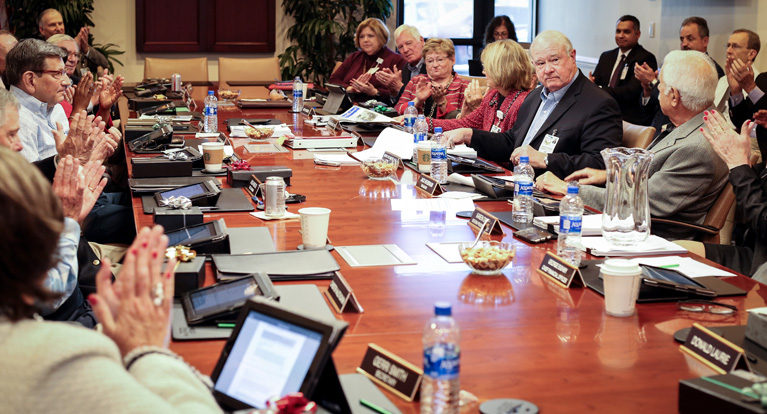
If hugs seemed more appropriate than hellos as members of the board of directors of Indian River Medical Center entered the hospital conference room last week, it was because the meeting to come was at its essence a goodbye.
Convened by chairman Wayne Hockmeyer, the last coming to order of the board of directors of the 80-year-old hospital was for the purpose of disbanding.
With pedigrees from corporate America worthy of a major metropolitan board, it’s likely IRMC’s volunteer directors never enjoyed ceding power as much as they did last week. Their dream of the hospital becoming part of the prestigious Cleveland Clinic was at the cusp of becoming reality.
The chief item on Wednesday’s agenda was to approve a handful of their ranks to join the brand-new board that will govern Cleveland Clinic Indian River.
There were clear symptoms of slaphappy – how else to explain belly laughs at the phrase “pending regulatory approval,” which found its way into a half-dozen remarks about the all-but-finalized merger.
There was also back-slapping and praise for the work done under the gun of the impending deal. That included a $7 million swing in operating revenues over expenses, from a $2.5 million loss in 2016-17 to $4.5 million in black ink in 2017-18 – though much of that was eaten up in attorneys’ fees, added insurance and other costs associated with the Cleveland deal.
But those were one-time charges, finance chairman Jack Weisbaum reported to the board as one contiguous smile seemed to circle the table. “It’s a very, very positive result,” he said, something resembling joy breeching his ever-somber tone. It seemed the once-struggling hospital had buffed itself up and done them proud, selling itself to the one of the highest-regarded health systems in America, if not the world.
“We are about to embark on an extraordinary journey,” Hockmeyer told the board. “This has been about as good a board as I think you could find: dedicated, knowledgeable, and pretty much unflappable. You brought a lot of talent to the performance of this hospital.”
There were misty eyes as interim CEO Karen Davis accepted thanks for what Hockmeyer and others called an incredible effort at the helm of a hospital in transition.
While assisting Cleveland Clinic’s attorneys and accountants as they combed through financial records, Davis managed to improve patient care, they said, raising safety scores, easing the strain at the emergency room, and coping with a steep rise in patient visits in a particularly bad year of the flu.
Davis, who has been widely praised through her year here, will return to her prior employer, the national health care consulting firm of Alvarez and Marsel, where she was a senior director.
“I know the board gave Karen some guidance – directions, maybe even, because we knew what we were in the middle of,” said Hockmeyer. “We wanted to make sure the performance of the hospital not only stayed the way it was, but that it got better. And it got better – it got better financially, it got better in patient care, it got better in terms of safety metrics, and it got better in terms of service to the community.”
As Davis unwrapped her going-away gift – a crystal vase from a beachside shop – she was nearly undone by a double-dose of bubble wrap. “This is the greatest challenge I’ve had all year,” she joked.
And there was rousing applause for the man who was named to be the first president of Cleveland Clinic Indian River, Dr. Gregory Rosencrance, who arrived four days earlier with his wife Jackie. Both are natives of Charleston, West Virginia, and share Davis’ Southern accent; Rosencrance joked it will ease the transition because the staff has already grown used to Davis’ drawl.
The personable Rosencrance made a strong impression: “He’s wonderful,” sighed one hospital leader, as if with relief. Along with a warm manner, he boasts a strong resume.
“This is a momentous thing for Indian River County and the ability of our people to get the kind of healthcare they’re going to have access to,” said Hockmeyer.
As Hockmeyer tried to gavel the final meeting to a close, director Don Laurie interrupted to get a word in about the chairman himself.
“To observe what Wayne and Marybeth [Cunningham, the Hospital District chairwoman] have guided us through was just an extraordinary act of leadership,” he said. “Hear, hear, to Wayne and Marybeth.”



